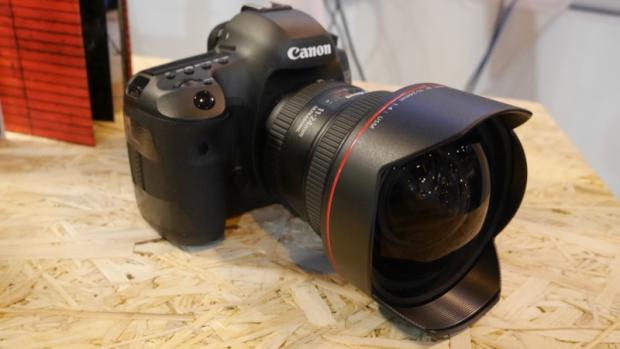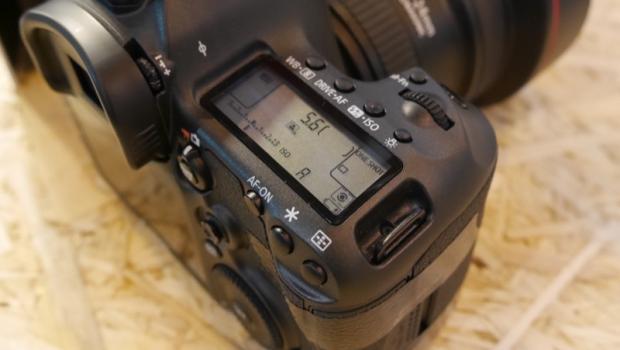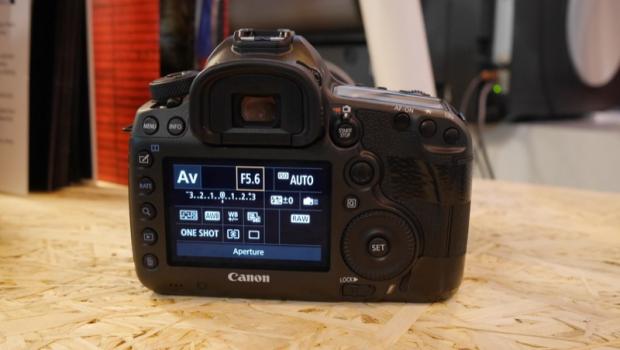Canon EOS 5DS/5DS R review
Canon has mostly avoided getting into a battle for higher pixel counts with rival Nikon, hovering around the 21-megapixel mark for its full-frame 5D Mk II and 5D Mk III. That all changed earlier this month when the company revealed not one, but two new flagship models; the 5DS and 5DS R. Both use a massive 50.6-megapixel full-frame sensor that eclipses the 36.3-megapixel sensor found in Nikon’s D810. We got the chance to try both out at the Photography Show in Birmingham this weekend, in order to bring you some first impressions.
Let’s get this out of the way first: the 50-megapixel sensor produces some insanely large images, in both senses of the word. Expect 8,788×5,792 resolution stills, which can reach up to 65MB each for JPEGs and 200MB each for RAWs. It’s impressive that Canon has managed to reach 5fps burst shooting speeds when dealing with such huge amount of data. Dual DIGIC6 processors keep that performance consistent and a USB3 data connection will help you get files off the camera and onto a computer for editing. It has 61 focus points across the sensor, of which 41 are the more sensitive cross-type.
The 5DS has an optical low-pass filter, while the 5DS R has a self-cancelling filter – this has a similar effect to removing the filter altogether, as other manufacturers have done with their high-end models. You’ll need high-quality glass to get the most from either sensor, although Canon has added 1.3x and 1.6x crop modes in case you want your lenses to reach further when shooting distant subjects. You’ll still end up with 30-megapixel or 19-megapixel stills.
As you would expect given the top-end target audience, both cameras have a full selection of buttons, dials and displays. The LCD screen on the top shows mode, aperture and exposure settings at a glance, with dedicated buttons above for ISO, white balance and focus. From the exterior, there’s very little to tell the 5DS apart from the current 5D Mk III, which will remain on sale for the foreseeable future.
That means there’s still no flip out screen for live view framing, although considering Canon expects these cameras to mainly appeal to fashion and landscape photographers this may not be a concern to its target audience. It’s for this reason that Canon has reinforced the tripod mount and revised the mirror lock-up mode to reduce the possibility of camera shake losing sharpness. Until we get one outdoors, it’s impossible to say how well this technology works, however.
Low light photographers will still be best served by the 5D Mk III, as the 5DS and 5DS R only have an ISO range of 100-6400 (expandable to 12,800). Otherwise, the interface, button locations and responsiveness all feel instantly familiar when you get either camera into your hands. Everything is within easy reach with one hand when it comes to shooting, although the playback button is a little too far away and requires both hands to reach.
Canon has deliberately avoided adding a wide selection of video modes, instead preferring videographers invest in the 5D Mk III instead. There’s no 4K shooting, despite the sensor being more than capable of UHD resolutions, and there’s no uncompressed HDMI output either. There is at least an in-camera time-lapse mode, and a bulb timer that can create ridiculously long 4-day exposures. The USB3 connector means there’s no room for a headphone jack, although seeing as there’s such little focus on video this shouldn’t be missed by many.
With a top-spec camera like this we’ll need plenty of time to analyse image quality before deciding on a final verdict, but in terms of ergonomics Canon customers will feel right at home with the 5DS and 5DS R. Whether the image quality difference will be enough to make 5D Mk III owners with no interest in video upgrade remains to be seen, but it certainly looks promising for fashion and landscape pros.
The 5DS is set to cost £2999 (body only) and the 5DS R should set customers back £3199 (again, body only). Both models are set to arrive around June, and of course we’ll be ready to bring you a full review as soon as we’ve got one in our hands.













